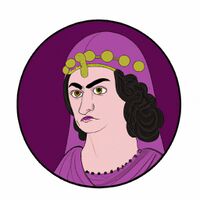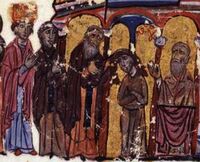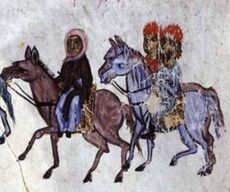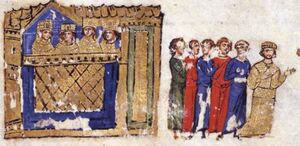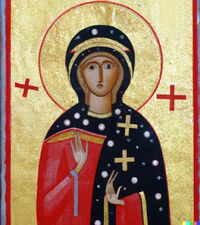Theodora
Theodora Porphyrogenita[1] (or Empress Theodora of the Byzantine Empire) was a remarkable ruler. Despite spending most of her life in seclusion or a convent, Theodora gained power at the age of 61 and held on to it until her death 15 years later.
Like her (in)famous sister Zoe, who went through three marriages and played the role of an adoptive mother to an unwanted stepson during her time in Byzantine politics, Theodora had many spins of fortune. She never married.
Marriage meat market[edit]
Theodora was born in 980 to emperor Constantine VIII and Helena. She had two elder sisters. Eudokia was the eldest but had suffered severe facial scars from a childhood disease and was parked in a nunnery. The middle sister, Zoe, was the 'belle' of the family. This was at least the report that came back to Holy Roman Emperor Otto III compiled by one of his ambassadors. Zoe's younger sister Theodora was also dismissed as a possible bride. The marriage was arranged but Otto died before he could meet Zoe.
Eudokia and Theodora were then in effect shut away from the public gaze, along with Zoe when she returned from her abortive marriage trip. At some stage, Constantine locked Eudokia inside a convent, leaving Zoe and Theodora to share the 'women's quarters'. The two sisters had never got on before,[2] and now they were sharing the same facilities, and long before lavatories came with twin sinks. It seemed to Theodora they were prisoners of their own family. Constantine was a weakling; though officially co-ruler of the Byzantine Empire with his elder brother Basil II, the latter made all the decisions. One of these was not to have either of the purple princesses married in the Byzantine nobility, as their husbands might use them to overthrow the existing regime. With no foreign marriage on offer either, Theodora and Zoe spent their party-popping years surrounded by old women and bald eunuchs. Whether this was Basil's idea (and he never married, either) or Constantine's is not known. But lack of heirs to the throne doomed the dynasty.
Refusal and compulsory virginity[edit]
The Byzantine Deep State belatedly realised that the empire needed a succession plan. Constantine suggested Theodora marry Romanos Argyros, a Byzantine bureaucrat closer in age to the emperor than to her. Old Romanus was also married, but that could be 'taken care of'.[3] However, Theodora refused to marry a divorcee, and no replacement husband was ever found for her. Meantime, Zoe had been assigned to marry a general called Constantine Dalassenos, but at the last minute, instead hooked up with Romanos Argyros, who would become emperor Romanos III.
Zoe and Romanos were a bad match. Theodora exploited this by getting involved in a plot to kill Romanos and send Zoe off to a convent. Presumably, Theodora would become empress and select her own husband to rule with her. But there was an informant involved in the plot. Unraveling it forced Romanos and Zoe to finally act like a couple. There was the usual round of banishments and physical mutiliations for the plotters. Theodora was spared any of that, but was sent from the imperial palace to a monastery with a walled-off section for women assigned penitence and punishment.
Zoe wanted to go further. She visited her sister with Romanos and a band of hardenend hairdressers. Theodora's fine clothes were ripped off her and she was forced to wear a nun's attire. To emphasise her sister's disgrace, the hairdressers cut off Theodora's hair and shaved her head bald. She was forced to take holy orders. At least Theodora avoided the eye-gouging or tongue removal that were the fate of an earlier empress.[4]
Second chance[edit]
For years, Theodora endured the life of a reluctant nun. However, she still had friends at court who supplied her with the news that Romanos III had been killed, and that Zoe had elevated her latest lover as emperor Michael IV. Zoe had a terrible taste in men.
In early 1042, Zoe's stepson and official co-ruler Michael V deposed Zoe and removed her to another monastery. Michael accused Zoe of wanting to kill him, which suggests he may have planned on killing her too. However, the mobs of Constantinople took exception to Zoe's deposition and started smashing up the city. Byzantine bureaucrats, scared of losing their pensions and office perks, freed Zoe and brought her back to the imperial palace. They were joined by partisans of Theodora. Would the two sisters slug it out like rival queen bees in a hive? Not this time. Instead, Zoe and Theodora became co-rulers of the empire, for now. Their first task was to eliminate Michael V. He fled to a church for protection after his followers deserted him.
Reports at the time said Theodora had been loudly 'reluctant' to share the throne with her sister. But this was all for show. Theodora was now an empress. Zoe wanted to just exile her 'bad-boy stepson', but Theodora insisted he have his eyes torn out. And they were.
The 'temporary' measure of having Theodora and Zoe as co-rulers of the Byzantine empire went on for months. Theodora showed aptitude for hands-on governance, as well as for revenge. The eyeless Michael was castrated on top of his earlier punishment and died soon after.
Constantine makes it three...or four...or five[edit]
Whilst Theodora was running the empire, her sister Zoe was out husband-hunting. In June 1042, Zoe married one of her ex-flames Constantine Monomachos, who was crowned emperor Constantine IX. This handsome, if vain man arrived with his mistress Maria Skleraina. Zoe didn't seem to be too bothered by this but Theodora saw Constantine as a threat. When Constantine invited a certain Gurandukht to the imperial orgy as well, palace relations became downright frosty.
Yet, in the end, nothing came of these unusual living arrangements. Constantine IX managed his relationships with a wife, sister-in-law and two mistresses with greater skill than he did the empire. Zoe didn't mind being used by other people, but Theodora refused. She had shown ability to rule, but Constantine relegated her to more 'domestic issues'.
Going solo[edit]
Theodora's story wasn't done yet. Her sister Zoe died in 1050. Constantine didn't offer to marry Theodora; she maintained her position as the Imperial Sister-in-Law, but spent her days at a monastery. Constantine deferred to Theodora, given her popularity. He continued to bungle, contriving to allow the Patriarch of Constantinople to meddle in a dispute with the Roman Catholics over theology, igniting the Great Schism — the final rupture between the Catholic Latin West and the Orthodox Greek East.
In 1055, Constantine IX died. The Byzantine government tried to select another emperor from the clerical staff, a governor or a general who could be easily bamboozled. However, since Theodora hadn't retired from office, she insisted there was no vacancy and took full power instead, emphasing her authority by again discarding her humble nun's habit for something more gaudy.
Theodora tried to rule the empire as she had done earlier. Though her officials recommended she marry, Theodora refused. Perhaps recalling her sister's farcical liaisons, Theodora was determined to rule alone. Perhaps she overdid it.
In August 1056 Theodora fell seriously ill. There was no official successor as such but the Byzantine bureaucrats favoured General Michael Bringas, a deeply uninspiring candidate but certain to do as he was told. He would become emperor Michael VI. Theodora never said whether she approved. In fact, she lost interest in politics or who would succeed her.
Legacy[edit]
Theodora's death marked the official end of the Macedonian dynasty. The family had held power since 867, though often obliged to share it with other families during this time period. It had started with a assassination/murder and ended with a spinster ruling on her lonesome.
References[edit]
- ↑ Which means 'the purple-born', indicating her high status.
- ↑ Spoiler: They never would.
- ↑ Get thee to a nunnery!
- ↑ As happened with Martina. See Constantine III and Heraklonas.
| Preceded by: Zoe and Michael V |
Byzantine Emperess 1042–1056 |
Succeeded by: Michael VI |
